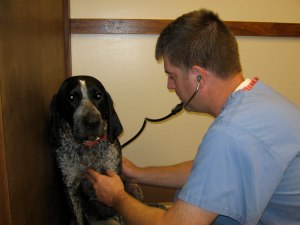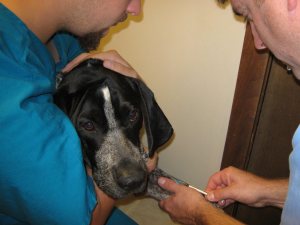Jane had her annual physical today at Ypsilanti Animal Clinic. Though she’s been to the clinic a few times in the past – a quick check-up when I first brought her home, a stitched wound in the winter – this was her first annual. (Last year’s was performed at Broken Road Rescue by Dr. Laura Chamberlain of Mid-Michigan Equine Services.) She was surprised to be going for a car ride so early in the morning (we usually don’t go out until lunch), but she gladly accepted what she thought was her good fortune.
She recognized the clinic when we arrived and showed no signs of distress as some dogs do. We walked around the building so she could sniff the markings of others and add her own to the mix. When we went inside, she waited patiently with me while I stroked her and periodically rewarded her with oatmeal treats. (I always bring along lots of treats to try to make visiting the doctor a more positive experience.) When the male vet tech came out to weigh her, though, she became visibly afraid. She was terrified of his hands and wouldn’t go near the scale. I coaxed her on to the scale and held her while the tech got a reading (64 pounds). When he led us into the examination room, Jane was still nervous and wanted nothing to do with him. He talked to us briefly, and then Dr. Kunoff arrived. MSU-trained, Dr. Kunoff is a wonderful veterinarian: calm, sensitive, patient, and a real dog lover (with a sweet spot for hounds). Dr. Kunoff has been at the clinic since 2001, and I hope he stays around forever. I’ve been visiting Ypsilanti Animal Clinic for years, but they’ve never been able to keep good doctors. My favorite, Dr. Muns – she performed a wonderful fatty tumor removal on Georgia – left years ago to join a large animal practice, and I haven’t connected with any of the other doctors since. It felt like a revolving door for a few years until Dr. Kunoff arrived. He’s such a good fit. He’s part of our community, and, most important, Jane trusts him.

Dr. Kunoff said Jane’s heart is in great shape (exercise!), her teeth are awesome (B.A.R.F!), and that, overall, she “looks great.” She received vaccines for kennel cough, distemper, and rabies, and then had blood drawn for her heartworm test.

I fed her oatmeal treats throughout the ordeal, and she really was a trooper. She even gave up and allowed the vet tech to handle her. (He was also very gentle.) I was actually surprised by her reaction to the vet tech. She was frequently afraid of me when I first adopted her, but she so completely trusts me now – including all the choices I make for her – that I forget sometimes about her fear. Despite her confidence with me, dogs, and people she knows, she can still be spooked by strangers, especially males.
I recently read two books about canine fear Scaredy Dog! Understanding and Rehabilitating Your Reactive Dog by Ali Brown and Help for Your Fearful Dog by Nicole Wilde. Brown’s book is awful. Devoid of research, it’s all anecdotal and poorly written. (My elementary-aged students communicate more effectively.) Wilde’s book, while still imperfect (top-notch dog books are extremely rare), is the less emotional of the two, and I was able to cull a couple of tidbits out of its 400-plus pages of definitions and exercises. One thing I definitely learned is that Jane is not what both authors call a “reactive” dog. While she’s certainly got fears and quirks, she would not be labeled a fearful dog. I also learned that Jane’s mistrust of people is not necessarily indicative of abuse in her past. It could also be the result of not being socialized. Rather than paraphrase, I’m going to simply transcribe Wilde:
“Lack of Socialization: When a dog displays fearful behavior around people, it is often assumed that the dog was abused, especially if her history is unknown. But in fact, a lack of early socialization is the more likely culprit. Many behaviorists believe that this early deficit is the primary reason dogs develop fear issues, especially toward strangers, other dogs, or new environments. Remember that dogs have a genetically programmed fear of the unfamiliar, an instinct designed to keep them safe. The engagement of that response is almost wholly avoidable by making most things dogs will encounter – dogs, people, places, sounds, touch, and movement – familiar through early and frequent exposure.” (9)
Of course I don’t know if this is Jane’s case or not, but I have been told that some people who keep hunting dogs do not treat them properly. They’re often considered things and not sentient beings and certainly not members of the family (which is all they really want). I have no idea what Jane’s first 20 months were like. I do know that the past 12 have been pretty good, and I hope and pray that, in time, she’ll have no memory of life before me.